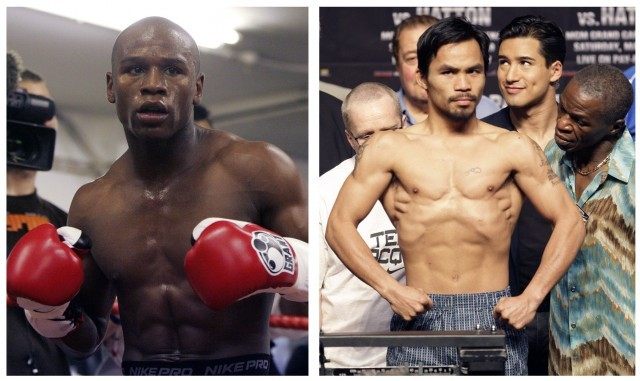The promoters of the Floyd Mayweather-Manny Pacquiao superfight look to cash in by charging as much as $100 for a home viewing of the pay-per-view bout. But one of the world’s most famous economists tells Breitbart Sports that a law of diminishing returns sets in when sellers price a product above what the market will bear.
“There are two effects a price has on revenue,” Arthur Laffer tells Breitbart Sports. “One is the arithmetic effect. If you double the price, you get twice as much per customer. The next is the economic effect. If you double the price, you are going to get fewer customers. These two effects always work in the opposite direction. When you increase price, the question is: At one point does the revenue go down?”
The May 2007 Oscar De La Hoya-Floyd Mayweather bout, which Money took by split decision, holds the pay-per-view record at 2.4 million buys. But it sold that many subscriptions at a price of $54.95. The promoters of Mayweather-Pacquiao hope to surpass that mark, and in the process provide as much as $180 million for the American and $120 million for the Filipino’s camp by some estimates. Dan Rafael reports that many of those staging the welterweight bout expect to eclipse 3 million buys. But in charging about $100—the price has not been officially set—for home buys, even approaching the high water mark may prove more difficult than they believe.
“I don’t know how sensitive the quantity is to price,” supply-side-economics pioneer Laffer explains about boxing pay-per views. “Let’s say they charge $1,000 per pay-per-view. They would clearly not get the hits. The question is: at $100, will they lose revenue? At some price point they will start losing revenue. It seems like a helluva high price to watch something on TV.”
And the price to watch the fight on TV pales next to the price to watch the fight ringside. The live gate looks poised to shatter the previous record, held by 2013’s Floyd Mayweather-Canelo Alvarez bout, by more than $50 million. By pricing choice seats at $10,000, the promoters expect $74 million just from the attendees at the MGM Grand Garden Arena in Las Vegas.
But finding 16,800 people to cough up an average of $4,400 per ticket might be easier than finding 2.4 million customers to splurge $100—even with the help of friends and family crowding into their living rooms—on a television program that could receive a quick cancellation due to an early knockout.
“It’s a general principle applying to everything,” the former professor at USC, Pepperdine, and the University of Chicago explained to Breitbart Sports of the economic concept associated with him. “Every product you sell has a Laffer curve. You can overprice a product and lose money. You can underprice a product and lose money. If I charged for bubble gum a million dollars a packet, I probably wouldn’t sell very many.”
Laffer’s own enthusiasm, or lack thereof, for the fight partly illustrates the famous economic theory tied to his name.
“I am a big boxing fan,” Laffer admits. “They should have fought three years ago. They may not be seniors yet. But they’re damn close. I don’t find this fight very interesting.”
“He’s not Mayweather anymore,” the sports fan/economist maintains. “Mayweather is an undefeated boxer, in my mind, forever. And Pacquiao is one amazing boxer as well. But Pacquiao is also long of tooth.”
Mayweather, 38, appears uncharacteristically hittable in recent bouts with Marcos Maidana and Miguel Cotto. Pacquiao, 35, has not knocked out an opponent in over five years. The skillsets the fighters made their names on—slick defense in Money’s case, fierce power in Pac Man’s—appear somewhat eroded. Declining skill sometimes counterintuitively makes for a better fight. Think Leonard-Hearns II or Ali-Frazier III. But clearly neither man fights at his peak on May 2.
So will Art Laffer watch the match for $100 in his living room?
“No,” the former advisor to Ronald Reagan informs, “nor is anyone who I know going to pay the money.”

COMMENTS
Please let us know if you're having issues with commenting.